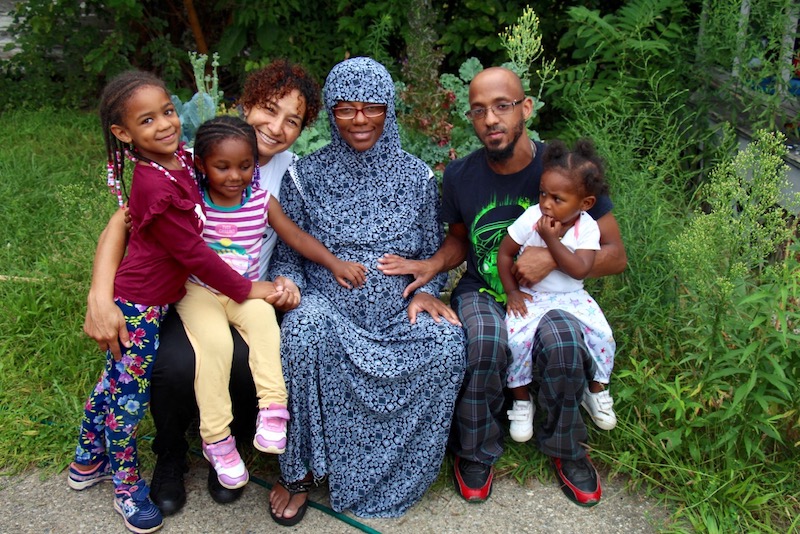
When Detroiters Habiba Allen and Yashua Tuck realized their fifth child, Duha, was on the way, they immediately agreed the new baby would be born at home with the help of midwife Heather Robinson. The birth would be peaceful, and they would share the moment with their four other children. The couple had delivered their first three children in a hospital under midwife care. But in early 2017, not long after they moved from Baltimore to Highland Park, Allen set out to find a home birth midwife in anticipation of the arrival of their fourth child, Ayah. The desire for this experience had long existed between Allen and Tuck — in Baltimore, where certified professional midwives were made legal just a few years ago, it hadn’t been an option. Then they found Robinson.Ěý
Ěý
When Allen and Tuck interviewed Robinson in 2017, they sensed an immediate connection between the midwife and their family, and they were drawn to her experience as a licensed paramedic — her day job. “In case of an emergency, she’d know what to do,” Allen says, “and as a skilled midwife, she’d know how to do things in a natural, holistic, let-a-woman’s-body-do-its-thing sense.”
Ěý
Robinson’s passion to work with other midwives was a deciding factor as well. Leading up to the pregnancy of Ayah, Jahmanna Selassie, a local midwife Robinson collaborates with, began to join in on check-ups. Robinson was attending an out-of-town conference when Allen delivered Ayah weeks later than anticipated, and Selassie was able to stand in as midwife. “I already knew her,” Allen says about Selassie, “and was already comfortable with her. “Miss Heather,” as the family now calls her, was at Allen’s side the following day providing postnatal care.Ěý
Ěý
For Robinson, midwifery isn’t just a job. It’s a living, breathing, around-the-clock lifestyle commitment. “It’s a baby in itself,” she says. And she’s crazy about it. Robinson runs a professional practice called Birth Beautiful,Ěýwhere she works with up to four birthing mothers a month: providing regular, in-home prenatal and postpartum visits, 24-hour access to clients, and ultimately, labor support and delivery. “I don’t go off call,” she says. “I’m always a midwife.”Ěý
Ěý
Robinson fell in love with midwifery over 20 years ago when, after finishing a tour with the U.S. Peace Corps in Honduras, Central America, she became pregnant and delivered, or “caught,” her own daughter in her in-laws home. The experience fueled a passion in Robinson that she was eager to bring back to her hometown of Detroit. Since then, Robinson’s assisted in nearly 300 births and seized every opportunity to be involved in childbirth: as an educator, a doula (a labor support person), and finally in 2015, as a certified professional midwife after graduating from Birthwise Midwifery School in Bridgton, Maine. She also serves on the State of Michigan Board of Licensed Midwifery.Ěý
Ěý

Robinson says many people she meets are surprised to learn that midwives still exist and are birthing babies naturally in hospitals and homes. Alongside Selassie and fellow Detroit midwife Nicole White, Robinson runs a pop-up midwifery clinic that visits city neighborhoods, particularly those with the highest disparity of outcomes for moms and babies, to offer birth education and expose families to care choice. “We’re trying to build awareness, and it’s not just for people to have a home birth,” she says. “It’s more so to understand that you have options, and what those options are, and to start conversations about your care, even in the hospital setting.”Ěý
Ěý
It’s tough for women to have positive prenatal and birthing outcomes in Detroit, where the infant mortality rate is at 14.2 per thousand, over double the rate of Michigan (6.8) according to the Michigan Department of Community Health, and where black families are twice as likely as white to lose children in this way. Robinson, who is mixed African American, is also a co-founder of the Mosaic Midwifery Collective, a Detroit-based collaborative committed to training midwives of color. “In the healthcare system, as a woman of color, most of the people that take care of you don’t look like you,” she says. “There is something nuanced when your care is given by somebody who may know your culture, and that you feel you can talk openly and honestly with.”
Ěý
The general Midwives Model of Care is a holistic guide, one focused on “monitoring the physical, psychological, and social well-being of an expectant mother during the childbearing cycle.” Through this model, intimate relationships are formed between a midwife and expectant mother as well as her family. It minimizes the use of technological interference. It offers hands-on assistance during labor and delivery, and it provides several early postnatal checkups for both mom and baby. Adopting this model, Robinson says, or even understanding that it exists, will help mothers advocate for themselves better, regardless of their care choice. “If more women understand how to advocate for themselves and take care of themselves without being so dependent on the institution, per se, we can do this together,” she says. “We can make an impact.”Ěý
Ěý
Robinson’s care was again evident during her second pregnancy experience with Allen. During the birth of Duha in August, Allen spent her gentle laboring hours cooking, nesting, and resting quietly in her home. There was no rush, no need to pack a bag and hurry out into the night.Ěý
Ěý
Tuck and Robinson filled a warm, birthing pool in the couple’s bedroom. “Everything was relaxed and peaceful,” Allen says. When the pushing began, the children heard their mother and came into the room and nestled around her. When it was time to push the baby out, Allen was so tired that she wanted to sleep, but Robinson encouraged her to stay strong. With her own hands, Allen then pulled Duha up onto her chest. Skin to skin in the warm water, they rested.
Ěý
“It was amazing,” says Robinson. And it wasn’t that every moment had to go just this way, but momentĚýtoĚýmoment, the choices were theirs to make.Ěý
|
| Ěý |
|










